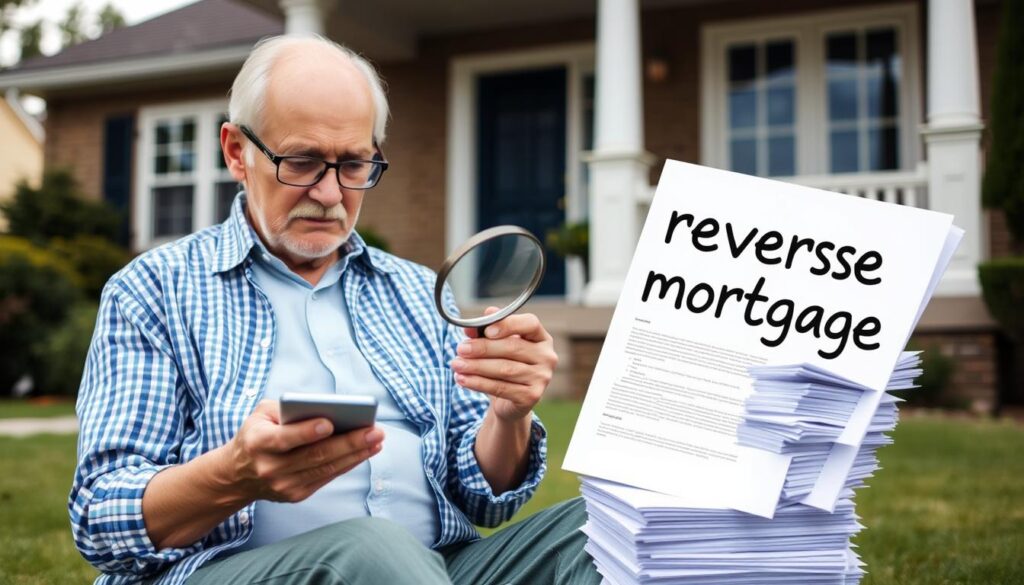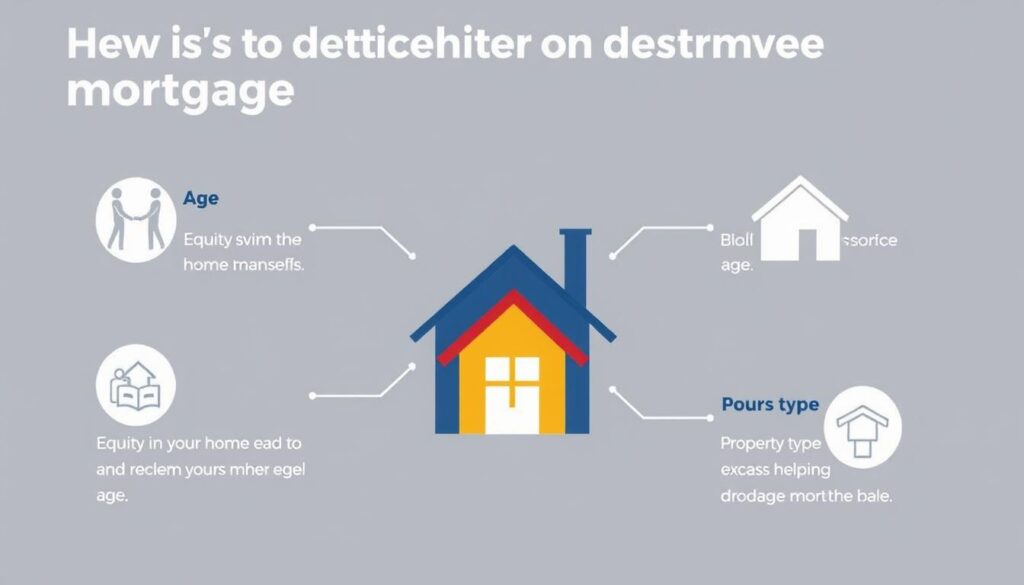Don’t let a low credit score deter you from exploring reverse mortgage options. Senior homeowners aged 62 and up may qualify despite bad credit. These unique loans prioritize age and home equity over credit history.
Home Equity Conversion Mortgages (HECMs) are a prime example of this approach. They offer a path for seniors with less-than-perfect credit to access their home’s equity.
Understanding the requirements is key to navigating reverse mortgages with poor credit. Let’s explore what you need to know about these loans. You might be surprised by the possibilities available to you.
Key Takeaways
- Reverse mortgages are available to homeowners 62 and older, regardless of credit score
- Home Equity Conversion Mortgages (HECMs) don’t rely on credit scores for approval
- Age, primary residence status, and home equity are crucial eligibility factors
- Bad credit doesn’t automatically disqualify you from a reverse mortgage
- Financial assessment looks beyond credit scores to evaluate eligibility
Understanding Reverse Mortgages and Credit Scores
Reverse mortgages offer seniors a unique financial solution. These products have different credit requirements than traditional loans. Let’s explore reverse mortgages and how they compare to conventional home loans.
What is a reverse mortgage?
Reverse mortgages let homeowners 62 and older tap into their home equity. The most common type is the Home Equity Conversion Mortgage (HECM).
HECMs make up 95% of reverse mortgages. These loans provide cash flow to seniors while they stay in their homes.

The role of credit scores in traditional mortgages
Credit scores are crucial in traditional mortgages. Lenders use them to assess a borrower’s creditworthiness and set loan terms.
A higher score often leads to better interest rates and loan options.
How reverse mortgages differ in credit requirements
Reverse mortgages take a different approach to credit. Credit history matters, but it’s not the main factor for approval.
The focus is on other aspects of the borrower’s finances. This makes reverse mortgages accessible to seniors with less-than-perfect credit.
| Factor | Traditional Mortgages | Reverse Mortgages |
|---|---|---|
| Credit Score Impact | High importance | Less critical |
| Monthly Payments | Required | Not required |
| Age Requirement | None | 62 or older |
| Primary Focus | Borrower’s ability to repay | Home equity and financial assessment |
Knowing these differences can help seniors explore their options. They can decide if a reverse mortgage fits their financial goals.
Qualifying for a Reverse Mortgage: Key Factors
Reverse mortgages have specific qualifications you should know about. These factors help determine if this financial option fits your situation. Let’s explore the main requirements.
Age Requirements
For a reverse mortgage, at least one borrower must be 62 or older. This age requirement is a crucial part of the qualification process.
Home Equity and Primary Residence
Your home must be your main living space to qualify. You’ll need significant equity in your property, usually around 50% or more. This equity plays a big role in determining eligibility.

Financial Assessment Process
Lenders check if you can handle ongoing costs. They look at your ability to pay property taxes and homeowners insurance. They also make sure you can maintain the property.
| Factor | Requirement |
|---|---|
| Age | 62 years or older |
| Property Type | Primary residence |
| Home Equity | Typically 50% or more |
| Financial Assessment | Ability to pay taxes, insurance, and maintenance |
Credit scores aren’t the main focus for lenders. However, they might review your credit history to check your financial responsibility. This assessment ensures you can meet reverse mortgage obligations long-term.
Can I Get a Reverse Mortgage With Bad Credit
Bad credit doesn’t automatically rule out a reverse mortgage. HECM loans, the most common type, have flexible credit requirements. These loans don’t have a set minimum credit score for approval.
Lenders look at your overall financial picture instead of just credit scores. They review your payment history for property expenses. They also check your ability to meet ongoing loan obligations.
Lenders assess the reasons behind past credit issues. A strong payment history for property taxes and insurance can help your chances.
- Payment history for property-related expenses
- Ability to meet ongoing loan obligations
- Circumstances leading to past credit issues
Lenders want to ensure you can maintain these payments after getting a reverse mortgage. They consider your whole financial situation, not just your credit score.
“A less-than-perfect credit score doesn’t mean you can’t get a reverse mortgage. We look at the whole picture, not just a number.”
If you’re worried about your credit, talk to a reverse mortgage counselor. They can explain how your situation might affect your eligibility. They may also suggest ways to improve your application.
Reverse mortgages help seniors access their home equity. You may still qualify if you meet age requirements and have enough home equity.
The Financial Assessment: Beyond Credit Scores
Reverse mortgage lenders examine more than just credit scores. They analyze a borrower’s entire financial situation. This helps ensure applicants can meet ongoing obligations.
Purpose of the Financial Assessment
This evaluation protects both borrowers and lenders. It confirms seniors can afford property charges and maintain their homes. It also safeguards lenders against potential defaults.
Evaluating Payment History and Financial Responsibilities
Lenders thoroughly review payment histories. They check how borrowers handled past debts and financial commitments. This includes examining:
- Mortgage payments
- Property tax payments
- Homeowners insurance premiums
- Utility bills
Assessing Residual Income
Residual income is crucial in the assessment. It’s the money left after paying monthly expenses. Lenders use this to evaluate ongoing property charge and living cost coverage.
| Region | 1-person household | 2-person household | 3-person household |
|---|---|---|---|
| Northeast | $540 | $906 | $1,150 |
| Midwest | $529 | $886 | $1,124 |
| South | $529 | $886 | $1,124 |
| West | $589 | $998 | $1,267 |
Options like Life Expectancy Set-Aside (LESA) exist for those with less-than-perfect credit. These can help qualifying borrowers manage property charges effectively.
Options for Seniors with Less-Than-Ideal Credit
Seniors with bad credit have reverse mortgage choices. FHA-insured Home Equity Conversion Mortgages (HECMs) and proprietary programs are available. These options help older homeowners tap into their home equity.
The Life Expectancy Set-Aside (LESA) helps those with limited income or credit issues. It sets aside loan funds to pay property charges. This ensures taxes and insurance are paid on time.
Financial counseling is a must in the reverse mortgage process. It helps seniors review their situation and explore options. Counselors offer credit improvement tips and guide borrowers through applications.
- Review your credit report
- Pay down existing debts
- Dispute any errors on your credit report
- Consider a co-borrower with better credit
Some lenders offer non-FHA reverse mortgages with flexible credit rules. These products may work for seniors who don’t qualify for HECMs. It’s smart to compare offers from different lenders.
Credit is important, but it’s not everything. Lenders also look at income, assets, and overall finances. Many seniors can find a suitable reverse mortgage with proper guidance.
FHA-Insured Reverse Mortgages (HECM) and Credit Considerations
FHA-insured reverse mortgages, or HECMs, have unique credit rules for seniors. Knowing these rules can help you apply more easily. Let’s explore how credit affects these mortgages.
FHA Guidelines on Credit Requirements
The FHA doesn’t set a minimum credit score for HECM applicants. This makes FHA-insured reverse mortgages available to many seniors. Your credit history doesn’t matter as much here.
Lender-Specific Credit Criteria
The FHA sets broad HECM credit rules. But individual lenders may have their own requirements. Some lenders might look deeper into your credit report.
They may study patterns and reasons behind any issues. This helps them judge how responsible you are with money.
Working with Lenders on Credit Issues
Don’t worry if you’re concerned about your credit. Many lenders will work with you to fix credit problems. They might ask why you had money troubles before.
Lenders may suggest ways to make your application better. This teamwork can help you get approved for an FHA-insured reverse mortgage.
- Provide documentation explaining past credit problems
- Show recent improvements in your financial situation
- Discuss options for meeting lender requirements
Keep in mind that lender rules can be different. Look around for a lender whose rules fit your situation. With patience and good talk, you can often solve credit issues.
Alternatives to Traditional Reverse Mortgages
Seniors have options beyond standard reverse mortgages for financial flexibility. Let’s explore alternatives that suit different needs and credit situations.
Proprietary Reverse Mortgage Programs
Private lenders offer proprietary reverse mortgages with unique features. These programs often have higher lending limits and flexible credit requirements. They’re great for high-value homes or complex financial situations.
Non-FHA Reverse Mortgage Options
Non-FHA options give lenders more freedom in setting approval criteria. This can help seniors with less-than-perfect credit. These loans may offer different rates or fees than FHA-backed reverse mortgages.
Other Financial Solutions for Seniors
Senior financial planning includes more than just reverse mortgages. Home equity loans, refinancing, and downsizing are all viable options. Each choice has its advantages and drawbacks.
- Home equity loans: Provide lump-sum borrowing against home value
- Refinancing: Lower interest rates or extend loan terms
- Downsizing: Free up equity by moving to a smaller home
A financial advisor can help create a plan for your unique needs. They’ll ensure you make the best choice for your future.
Improving Your Chances of Approval
You can boost your odds for reverse mortgage approval, even with poor credit. Focus on paying off debts and keeping up with property expenses. These actions show lenders your commitment to financial responsibility.
Financial counseling can be a game-changer for your application. A counselor offers valuable tips and guides you through the process. They’ll help you prepare for the complexities of reverse mortgages.
Open communication with lenders is crucial. Don’t hide past credit issues from them. Many lenders work with borrowers facing credit challenges.
By being upfront, you might find lenders experienced in similar situations. They can offer tailored solutions to fit your needs.
Improving your financial picture takes time. Stay patient and persistent in your efforts. With the right approach, you can increase your chances of securing a reverse mortgage.
FAQ
What is a reverse mortgage?
How do reverse mortgages differ from traditional mortgages in terms of credit requirements?
What are the key factors for qualifying for a reverse mortgage?
Can I get a reverse mortgage with bad credit?
What is the purpose of the financial assessment for reverse mortgages?
What options are available for seniors with less-than-ideal credit who want a reverse mortgage?
How do FHA-insured reverse mortgages (HECMs) handle credit requirements?
What are some alternatives to traditional reverse mortgages for seniors with credit issues?
How can I improve my chances of getting approved for a reverse mortgage with bad credit?
Source Links
- Can I Get a Reverse Mortgage With Bad Credit? | Senior Lending – https://senior-lending.com/hecm-reverse-mortgage-bad-credit/
- Can You Get a Reverse Mortgage with Bad Credit? – https://longbridge-financial.com/blog/reverse-mortgages/can-you-get-a-reverse-mortgage-with-bad-credit/
- Reverse Mortgage with Bad Credit? Explore with Opulence Home Equity – https://opfunding.com/reverse-mortgage-with-bad-credit/

